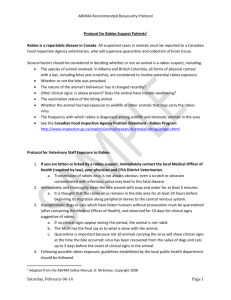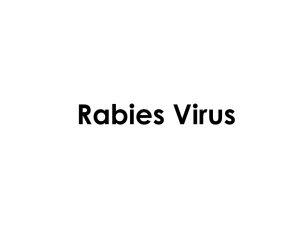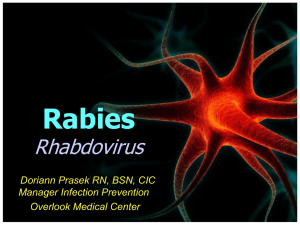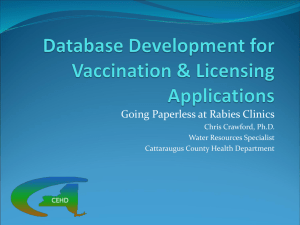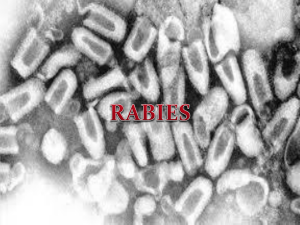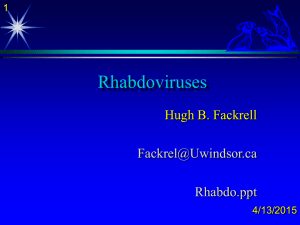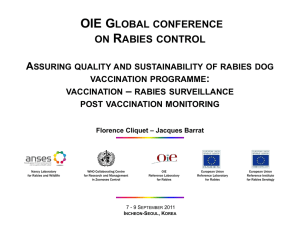Rabies Supplemental Information for Law Enforcement Officers
advertisement
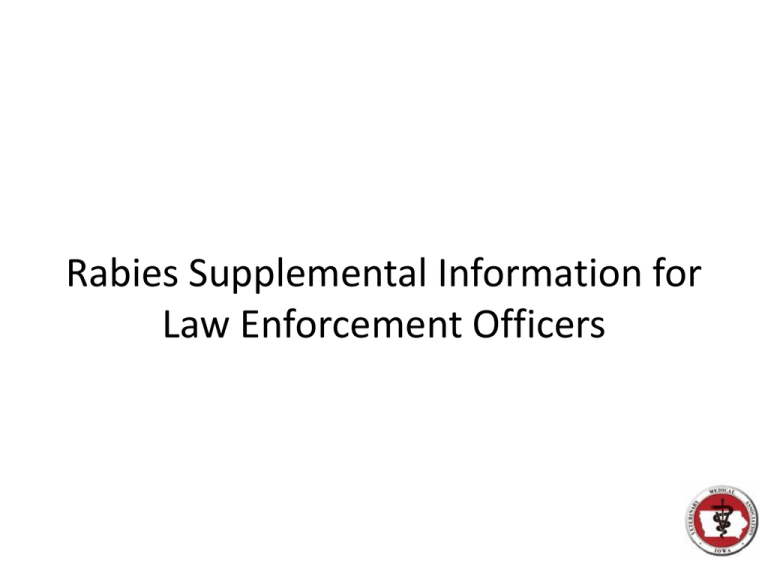
Rabies Supplemental Information for Law Enforcement Officers Topics • How do you know if you (or someone else) has been exposed to rabies? • Quarantines: Dogs, Cats, and Ferrets Only • Other mammals that expose humans • Assisting with animal capture • Animal rabies testing in Iowa • Vaccination requirements • Case examples • Frequently asked questions How do you know if you or someone else has been exposed to rabies? The rabies virus is transmitted through saliva or nervous system tissue. • What is considered an exposure? – Bite from a potentially infected animal – Saliva or nervous tissue contact to open wounds – Saliva or nervous tissue contact to mucous membranes (eyes, nose, mouth) • What is not considered exposure? – Saliva or nervous tissue contact to INTACT SKIN – Contact with blood, urine, or feces – Touching or petting an animal Bat-specific exposure criteria • Exposure criteria for bats include all those listed on the previous slide and the following: – – – – Waking up to find a bat in the room you are sleeping in Finding a bat in a room with an unsupervised child Finding a bat in a room with incapacitated person Contact with a bat and unsure whether you were bitten (i.e. bat flies into your arm) • Exposure criteria is not based upon finding a potential wound Quarantines / Confinement • When a dog, cat, or ferret exposes a human, it can be quarantined for 10 days (in lieu of euthanasia and testing) . – Dogs, cats, and ferrets are the only animals that can be quarantined • If the animal becomes sick with signs of rabies during the 10 day quarantine it should be euthanized and tested immediately • If the animal is healthy at the end of the 10 day quarantine, it did not pass rabies to the person it exposed Confinement Related State Laws Iowa Code: Chapter 351.39 Confinement • If a local board of health receives information that an animal has bitten a person or that a dog or animal is suspected of having rabies, the board shall order the owner to confine such animal in the manner it directs. • If the owner fails to confine such animal in the manner directed, the animal shall be apprehended and impounded by such board, and after ten days the board may humanely destroy the animal. • If such animal is returned to its owner, the owner shall pay the cost of impoundment. Confinement Related State Laws 351.36 Enforcement. • Local health and law enforcement officials shall enforce the provisions of sections 351.33 to 351.43 relating to vaccination and impoundment of dogs. Such public officials shall not be responsible for any accident or disease of a dog resulting from the enforcement of the provisions of said sections. In-Home vs. In-Clinic/Shelter Quarantine • Local decision based on your county’s / municipality’s procedures – Some counties / municipalities base decision on the following factors: • Vaccination status of the dog, cat, or ferret • Whether the owners seem trustworthy • Whether the owners have adequate facilities to quarantine / confine What if you don’t have the dog, cat, or ferret? • If you may be able to find the animal and can positively identify it, it may be reasonable to wait up to 72 hours from the time of the exposure to find and capture it. • If you don’t find it after 72 hours or you can not positively identify the animal, rabies shots are usually recommended for those exposed. Other mammals • Can not be quarantined because we don’t know how the disease effects them. • If there is a human exposure, in most cases the animal will need to be tested. – If the animal is not available for testing (ie. the bat flies out the window), rabies shots may be recommended for the people exposed. Assisting with animal capture • Ask whether there was a human exposure before letting it go. As animals that expose humans will likely need to be tested or quarantined. • Do not shoot the animal in the head if it needs to be tested for rabies • If you are capturing a bat for rabies testing, try to do so gently. If there is excessive trauma the specimen may not be testable. Animal Rabies Testing • State Hygienic Laboratory, Iowa City – – – – 800-421-4692 Available for after-hours or emergency testing Only test animals that have exposed humans Testing is Free • Iowa State University, Veterinary Diagnostic Laboratory, Ames – 515-294-1950 – Human and animal-to-animal exposures – Fees for testing State Law Requiring Rabies Vaccination • All dogs six months of age and older should be vaccinated. – Dogs kept in kennels and not allowed to run at large are not subject to these vaccination requirements. • Some counties and municipalities have more restrictive laws that require other species, like cats for example, to be vaccinated at well. • It is recommended that all pets and valuable livestock be vaccinated against rabies. Case Example #1 A small child is riding his bike down the street and is bitten in the leg by a stray dog. Questions: 1) Do you have the dog? 2) If not, could the child positively identify the dog if you were to capture it? Case Example #2 A person calls you to help them capture a bat in their home Was anyone exposed to the bat? If exposure occurred, test the bat. Frequently Asked Question • If a dog bites someone but is current on its rabies vaccine do we still need to quarantine it for 10 days? • YES Frequently Asked Question What if we don’t have the dog, cat, or ferret that has exposed a human, but think we will find it soon? • Generally, if the animal is not available for quarantine (for example a dog jumps the fence, bites the neighbor, and runs away) but you think it will be found and it can be positively identified as the animal that exposed the human, you can wait up to 72 hours from the time of the bite. – If you haven’t found the animal after 72 hours, usually rabies shots are recommended for the person exposed. Frequently Asked Question • If the authority to mandate a 10 day quarantine falls to local boards of health, can local law enforcement be involved in enforcement of the quarantine? Yes, according to Iowa Code Chapter 351. Local health and law enforcement officials shall enforce the provisions of sections 351.33 to 351.43 (this includes the confinement law) relating to vaccination and impoundment of dogs. Such public officials shall not be responsible for any accident or disease of a dog resulting from the enforcement of the provisions of said sections. Contact Information • Iowa Department of Public Health – Can provide the national recommendations for assessing rabies exposures, giving rabies post exposure treatment, and testing animals. – Available for 24/7 consultation • Business hours – 800-362-2736 • After hours – 515-323-4360 (this will connect with State Patrol Dispatch, tell them you have a rabies question for public health and the on-call epidemiologist will call you back). Additional Resources • Iowa Rabies Manual • List of Local Points of Contact for Rabies Quarantine Enforcement

